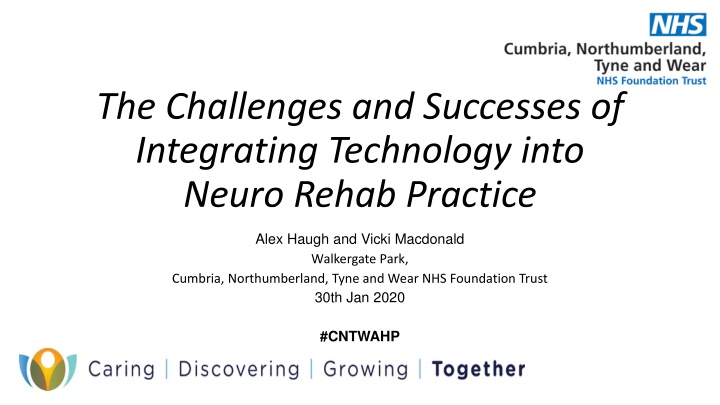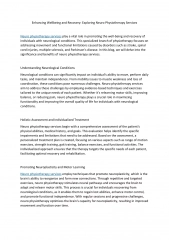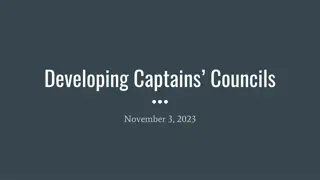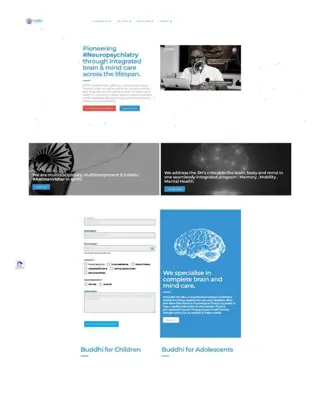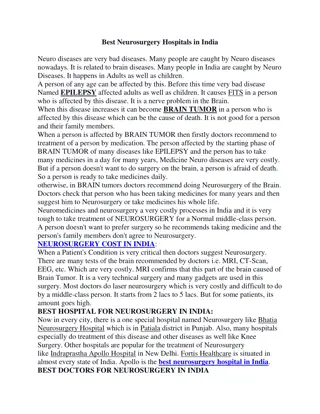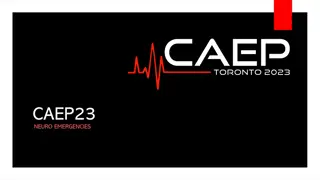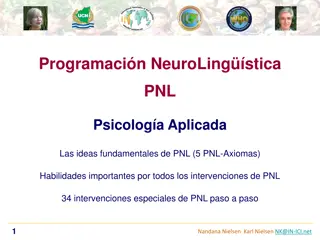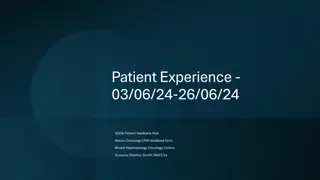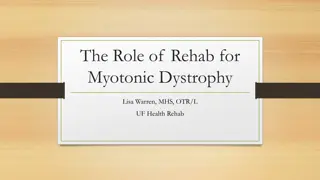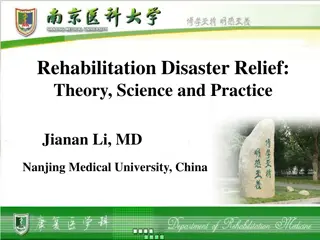Challenges & Successes of Integrating Technology into Neuro Rehab Practice
People facing neurological injuries may benefit from utilizing technology in rehabilitation practices. This initiative explores the use of exercise therapy apps and mobile technology in complementing traditional therapy sessions to enhance patient recovery. The presentation discusses the drivers, benefits, challenges, and initiatives in integrating technology into neurorehabilitation practices.
Download Presentation

Please find below an Image/Link to download the presentation.
The content on the website is provided AS IS for your information and personal use only. It may not be sold, licensed, or shared on other websites without obtaining consent from the author.If you encounter any issues during the download, it is possible that the publisher has removed the file from their server.
You are allowed to download the files provided on this website for personal or commercial use, subject to the condition that they are used lawfully. All files are the property of their respective owners.
The content on the website is provided AS IS for your information and personal use only. It may not be sold, licensed, or shared on other websites without obtaining consent from the author.
E N D
Presentation Transcript
The Challenges and Successes of Integrating Technology into Neuro Rehab Practice Alex Haugh and Vicki Macdonald Walkergate Park, Cumbria, Northumberland, Tyne and Wear NHS Foundation Trust 30th Jan 2020 #CNTWAHP
A little about us. We work in Neurorehabilitation at a specialised centre. We are not self proclaimed technology experts We do not work in a service where we have a lot of access to extra technology on hand.
Objectives To understand the drivers behind increasing our use of technology in the NHS and in our day to day work. To think of benefits and challenges of using technology in our clinical practice. To share what we have done in our service. To reflect on our own practice and how we can make changes to embrace technology. Ultimately to encourage everyone to increase technology use in day to day working life. https://youtu.be/lBVAz9D8uw0
Introduction. People surviving life changing neurological injuries often experience reduced function including reductions in; mobility, upper limb function, communication and cognition. Digital health and artificial technology have an increased presence in everyday life. Rapid development in mobile technologies could provide a resource- effective supplement to sessions and promote a proactive self- management approach. Within Walkergate Park physiotherapy service we wanted to review if we could utilise exercise therapy apps and mobile technology to compliment face to face therapy session.
BUT. We ve always done it this way NHS70 The Digital Age. (2018) https://youtu.be/aN0Vt9DUEwM
This is not a new initiative: This is not a new initiative: Feb 2012; Government press release that discussed GPs prescription of apps for patients. March 2013; The NHS commissioning board developed an NHS library of approved apps. This had the backing of Tim Kelsey, National Director of Patients and Information Spring and Autumn 2017; Directors from Digital experience at NHS England discuss their vision for using digital technology and Public Health England produce guidance criteria for health app assessment October 2017; Northern Devon Healthcare NHS Trust s stroke therapy team launched a website to help patients find the best apps to aid in rehab and recovery following a stroke or brain injury- mytherappy.co.uk May 2018; Empower the person; roadmap for digital health and care services (associated with the 5 year forward plan commenced in 2014- Chapter 10 Harnessing Technology and Innovation- increase the use of apps to help people manage their own health ) July 2018; CSP/Frontline discuss how new technology is shaping care. CNTW AHP Objectives; use of technology for AHPs, robotics through to apps
Matt Hancock (Health Secretary) Matt Hancock (Health Secretary) Long term health plan Jan 2019 health plan Jan 2019 Long term 487 million pounds promised to transform use of technology within the NHS Section 4. Digitally-enabled primary and outpatient care making better use of data and digital technology Over the next five years every patient in England will have a new right to choose the option of having digital-first contact through telephone or online consultations usually from their own practice or, if they prefer, from one of the new digital GP providers. Long term health plan Jan 2019 trusts will go digital by 2023 https://www.longtermplan.nhs.uk/wp-content/uploads/2019/01/nhs-long-term-plan-june- 2019.pdf What will patients get out of the NHS long term plan? https://www.youtube.com/watch?v=H3I1NS8cyBE
Link to twitter questionnaire: https://nhsdigital.eu.qualtrics.com/jfe/form/SV_6LSTwUCgevlSGwJ https://forms.gle/J2CcysFhZWBwTndv9
Links: https://digital.nhs.uk/services/nhs-apps-library https://www.my-therappy.co.uk/ https://www.england.nhs.uk/five-year-forward-view/next-steps-on-the-nhs-five-year- forward-view/harnessing-technology-and-innovation/ https://www.csp.org.uk/frontline/article/new-nhs-technology-strategy-aims-empower- patients https://www.ntw.nhs.uk/content/uploads/2017/08/Agenda-item-8-i-AHP-Strategy-2017- 2022-MQ-v7-M-Quinn-FINAL-11.pdf Use of Twitter; @NHSDigital, @DigitalAhp Podcasts and TED talks; - NHS Long Term Plan: The Doctor will Skype you Now (The labour digital) - An AI smartwatch that detects seizures (TED Health) - Digital medicines (RSM Health Matters)
Inpatient physiotherapy WGP: We wanted to do something about this and explore what we could do to enhance our use of technology in our everyday sessions. So we set up a working group. Aim: To review if there are any therapy apps which could enhance participation in exercise and promote self management throughout inpatient stay.
What we did next? Focus groups (service user forum and physiotherapists) Literature search Linked with IT Downloaded Apps found
Not quite so simple.. As we worked through the project we were left with more questions than answers.
Logistical nightmares (Local level): Information governance. Where will this be stored so it is accessible to everyone? Do we loan the patients the I-pad to engage with Apps? Are the apps appropriate?/ sufficient evidence base? Android vs IOS systems? How do we get an I-cloud account to gain access to the apps? How can we make sure nothing is stored on the I-Pad and I- Cloud? How to we access the internet on the I-pad? Can we download off the I-pad onto the computer? What should the password be for the I-Pad? Funding of equipment and paying for apps? Will people embrace new technology and change clinical practice?????
Data protection: Consent, and what is the data being used for? Clinicians having the time for this project and other projects Money to implement technology. Challenges on a National level: Upskilling staff in the use of technology, intro in uni curriculum Workforce: We are trained clinicians not statisticians. Will this replace the human aspect of care? Responsibilities in safe use of technology, ethics Upscaling across the entire NHS (umbrella, extrapolate from trust to trust)
What is the future of our digital NHS? Image result for mcdonalds logo Image result for amazon logo OR McDonald's wants to fully embrace technology to boost sales and keep one step ahead of fast food and fast casual restaurants. The company could use kiosks, wearables, smartphones, mobile apps, and other technology solutions to give customers a wider method of ordering food. They have implemented a huge amount of technology Working more efficiently Reduce fulltime workforce Saving money We see the experience being made so much better through technology ..whatever's out there we re going to be there trying it early No reduction in workforce as they value human interaction with customers
What is appening now? Use of the I-pad for physiotherapists across inpatients and community teams. The I-Pad is stored in a central office. I-Pad is signed in and out, this is so we can audit its use.
General Rules: How to guide for logging onto and off the internet Apps can be downloaded. The I-Pad is not issued to patients. All video s of patients should be deleted off the I-Pad by the end of the working day. Diary used for auditing and signing in/out purposes.
